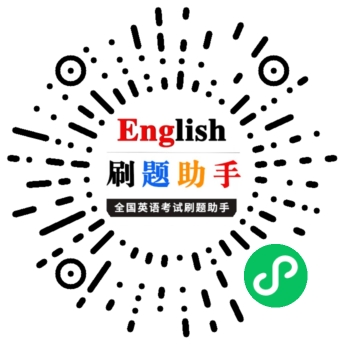2021年公共英语一级冲刺试题:阅读理解(8)
Sadness and happiness are often talked about by people in their spare time. Most people want themselves to be happy for ever, but few know how to find happiness. Others say if you own lots of money and success, you will be happy. However, money and success alone do not bring lasting happiness. A famous a Greek thinker, Aristotle, said, “Happiness depends upon ourselves.” That’s to say, we make our own happiness. Here are a few suggestions to help you be happier.
The first secret of happiness is to enjoy the simple things in life. Too often, we spend so much time thinking about the future. For example, getting into college or getting a good job, which we fail to enjoy the present. You should enjoy life’s simple pleasures, such as reading a good book, listening to your favorite music, or spending time with close friends. People who have several close friends often live happier and healthier lives.
Another secret to living a happy life is to be active. Many people go dancing or play sports. People can forget about their problems and only think about the activities. Finally, many people find happiness in helping others. Studies show that people feel good when they spend their time helping others. If you want to feel happier, do good things for someone. You can help a friend with his or her studies, go shopping or help out with some things around the house for an elderly person.
If you do above, you will be happy.
1. How many suggestions of happiness are mentioned in this passage?
A. One. B. Two. C. Three. D. Four.
2. If you want to enjoy the simple things in life, you can ________.
A. listen to your favorite music
B. remember some problems
C. think about getting into college
D. read a bad book
3. According to the passage, which of the following statements is NOT true?
A. Money and success alone do not bring you lasting happiness.
B. If you want to feel happier, you can go shopping for an elderly person.
C. Spending so much time thinking about the future can enjoy the present.
D. Active person may live a happier life than inactive person.
4. What’s the main idea of this passage?
A. How to live a happy life.
B. How to depend upon ourselves.
C. How to help the old people.
D. How to get a good job.
Do you know why so many animals do not stay in one place? Birds, fish and other animals move from one place to another place at a certain time. They move for different reasons: most of them move to find food more easily, but others move to get away from places that are too crowded.
When cold weather comes, many birds move to warmer places to find food. Some fishes give birth in warm water and move to cold water to feed. The most famous migration is probably the migration of fish, which is called “salmon”(鲑鱼). This fish is born in fresh water but it travels many miles to salt water. There it spends its life. When it is old, it will return to its birthplace in fresh water. Then it gives birth and dies. In northern Europe, there is a kind of mouse. They leave their mountain homes when they become too crowded. They move down to the low land. Sometimes they move all the way to the seaside, and many of them are killed when they fall into the sea.
Recently, scientists have studied the migration of a kind of lobster(龙虾). Every year, when the season of the bad weather arrives, the lobsters get into a long line and start to walk across the floor of the ocean. Nobody knows why they do this, and nobody knows where they go. So, sometimes we know why humans and animals move from one place to another place, but at other times we don’t. Maybe living things just like to travel.
5. The reason for most of the animals to move is ________.
A. to get away from un-crowded places B. to find their own parents
C. to want to kill themselves D. to find food more easily
6. Where does young salmon(鲑鱼) spend its life?
A. In fresh water. B. In salt water.
C. In mountain homes. D. In its birthplace.
7. When do the lobsters(龙虾) begin to move another place?
A. When their homes become too crowded.
B. When the season of the bad weather arrives.
C. When they want to give birth.
D. When their food is eaten up.
8. The underlined word migration in the passage means ________.
A. 迁徙 B. 习性 C. 运动 D. 寻觅
In modern society, people use money every day. It seems that it is very important in our life. That’s because without money you can’t buy any goods(商品) you want. But I think few people know the history of money.
Long ago, people did not need money. They lived on wild animals, fruits and other plants. As time passed, people learned to raise animals and crops. Sometimes, families produced more than they needed, so they started to trade with other families. Later, people began to use money as a means of exchange. However, it was not the kind of money we use today. They used shells, rice, salt, large stones, etc.
During the 600s BC, people began using coins as money. They soon found that coins were easier to carry than goods and lasted a long time. Later, countries began to make their won coins.
The Chinese were the first to use paper money, probably as early as the 11th century. The Italian traveler Marco Polo saw the Chinese using money when he visited China in the 1200s. However, European countries did not start using paper money until 1600s.
Today, we have many ways to pay for things. We do not use coins or paper money. Often, people prefer to pay for things by card. Paying with a card is easier and safer than carrying around a lot of “real” money.
9. People used ________ as a means of exchange before the 7th century BC.
A. paper money B. card C. large stone D. coins
10. From the passage, we know that European countries used paper money in the ________.
A. 11th century B. 12th century C. 16th century D. 17th century
11. Which of the following is TRUE in this article?
A. Marco Polo was from Canada.
B. Chinese used paper money earlier than Italy.
C. Today people often prefer to pay for things by salt.
D. Carrying around much “real” money is easier and safer than Paying with a card.
参考答案:
1-5. CACAD
6-11. BBACDB
本文标签:公共英语等级考试 阅读指导 2021年公共英语一级冲刺试题:阅读理解(8)
转载请注明:文章转载自(http://www.ggyingyu.cn)
以上就是关于“2021年公共英语一级冲刺试题:阅读理解(8)” 的全部内容,想获取更多公共英语等级考试的相关资讯,如公共英语等级考试常见问题、政策公告。 敬请关注“微信公众号”,第一时间获取报名报考资讯信息~

《公共英语等级考试网》免责声明:
1、由于各方面情况的调整与变化,本网提供的考试信息仅供参考,考试信息以省考试院及院校官方发布的信息为准。
2、本网信息来源为其他媒体的稿件转载,免费转载出于非商业性学习目的,版权归原作者所有,如有内容与版权问题等请与本站联系。联系邮箱:812379481@qq.com。


